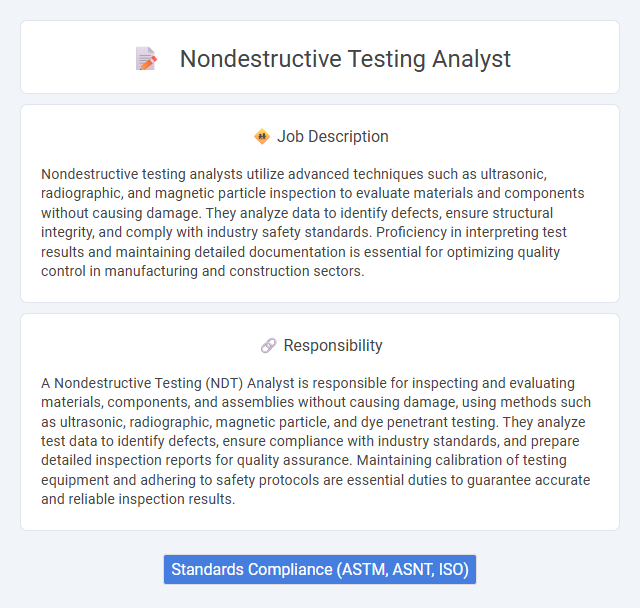
Nondestructive testing analysts utilize advanced techniques such as ultrasonic, radiographic, and magnetic particle inspection to evaluate materials and components without causing damage. They analyze data to identify defects, ensure structural integrity, and comply with industry safety standards. Proficiency in interpreting test results and maintaining detailed documentation is essential for optimizing quality control in manufacturing and construction sectors.
Individuals with strong attention to detail and analytical skills are likely to be well-suited for a nondestructive testing analyst role, as the job frequently involves identifying material defects without causing damage. Those with a high level of patience and the ability to work under pressure may have a higher probability of success due to the precision required in interpreting test results. Candidates who are uncomfortable with repetitive tasks or lack interest in technical data analysis might find this job less suitable.
Qualification
Nondestructive testing analysts typically require certifications such as ASNT Level II or III in methods like ultrasonic, radiographic, or magnetic particle testing. A bachelor's degree in engineering, materials science, or a related technical field enhances job prospects, alongside strong analytical and problem-solving skills. Proficiency with specialized NDT equipment and knowledge of industry standards such as ASTM or ISO significantly improve qualification and effectiveness in this role.
Responsibility
A Nondestructive Testing (NDT) Analyst is responsible for inspecting and evaluating materials, components, and assemblies without causing damage, using methods such as ultrasonic, radiographic, magnetic particle, and dye penetrant testing. They analyze test data to identify defects, ensure compliance with industry standards, and prepare detailed inspection reports for quality assurance. Maintaining calibration of testing equipment and adhering to safety protocols are essential duties to guarantee accurate and reliable inspection results.
Benefit
A Nondestructive Testing (NDT) analyst likely experiences substantial benefits, including enhanced career stability due to the high demand for safety inspections across industries such as aerospace, oil and gas, and manufacturing. The role probably offers opportunities for professional growth through exposure to advanced technologies and certifications that increase expertise and marketability. Competitive salaries and the potential for travel to various job sites may further contribute to overall job satisfaction and financial reward.
Challenge
The nondestructive testing analyst role likely involves complex problem-solving challenges, requiring accuracy in detecting material flaws without causing damage. Handling advanced technologies and interpreting intricate data might pose ongoing difficulties that demand specialized knowledge. Adapting to new testing methods and maintaining compliance with rigorous industry standards probably adds to the position's demanding nature.
Career Advancement
Nondestructive testing analysts play a crucial role in inspecting materials and structures without causing damage, using advanced techniques like ultrasonic, radiographic, and magnetic particle testing. Career advancement opportunities include progressing to senior analyst positions, specializing in niche NDT methods, or moving into supervisory and quality assurance roles within aerospace, manufacturing, or energy sectors. Obtaining industry certifications such as ASNT Level II/III or obtaining a degree in materials science can significantly boost career growth and salary prospects.
Key Terms
Standards Compliance (ASTM, ASNT, ISO)
Nondestructive testing analysts ensure inspections adhere strictly to international standards such as ASTM, ASNT, and ISO, guaranteeing accuracy and reliability in defect detection across various industries. Expertise in interpreting and applying these standards optimizes evaluation processes and maintains compliance with regulatory requirements. Proficiency in these protocols enhances data integrity, safety assurance, and quality control in nondestructive testing methodologies.
 kuljobs.com
kuljobs.com